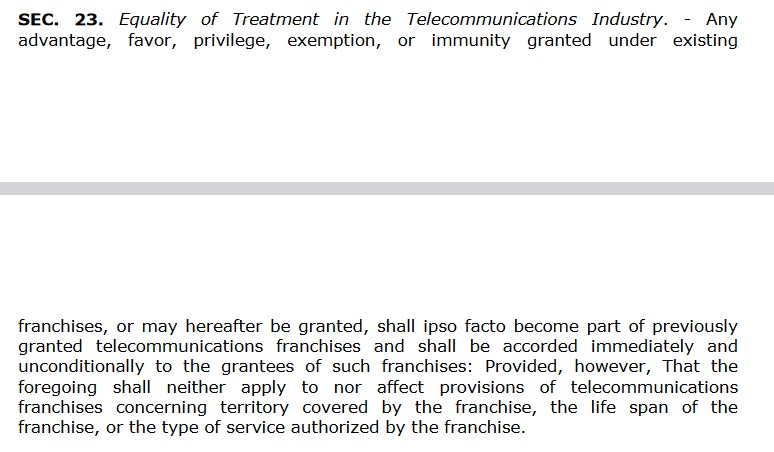
The telecommunications landscape in the Philippines underwent a significant transformation with the enactment of Republic Act No. 7925 (RA 7925), also referred to as “The Public Telecommunications Policy Act of the Philippines.”
This landmark legislation, approved by President Fidel V. Ramos on March 16, 1995, has played a pivotal role in shaping the country’s telecommunications industry, promoting competition, enhancing service quality, and ensuring that telecommunications services are accessible to every Filipino.
What is the essence of Republic Act No. 7925?
At its core, RA 7925 provides the legal and regulatory framework for the telecommunications sector in the Philippines.
Its purpose is twofold: to foster the development of a robust, efficient, and reliable telecommunications infrastructure, and to ensure that this infrastructure is accessible to the public at reasonable rates.
The act underscores the importance of telecommunications in the socioeconomic development of the country and aims to maximize its use as a vital tool for progress.
What are the goals and the declaration of the National Policy under Republic Act No. 7925?
RA 7925 articulates a clear national policy on telecommunications, advocating for a competitive market to drive innovation, improve service quality, and lower costs.The legislation’s goals are ambitious yet clear:
- to create a regulatory environment conducive to competition
- attract foreign investment within the framework of Philippine laws
- leverage telecommunications as a catalyst for national development.
How does RA 7925 promote competition within the telecommunications industry in the Philippines?
Republic Act No. 7925 (RA 7925) is instrumental in fostering a competitive environment within the Philippine telecommunications industry.
It does so by setting clear guidelines for market entry, ensuring that no single entity monopolizes the sector.
The act encourages the entry of new players by streamlining licensing processes and establishing fair and transparent regulatory practices.
Additionally, RA 7925 mandates the National Telecommunications Commission (NTC) to oversee compliance with antitrust provisions, preventing anti-competitive practices and ensuring a level playing field for all operators.
How has foreign investment in the telecommunications sector been impacted by RA 7925?
The enactment of RA 7925 has significantly impacted foreign investment in the Philippines’ telecommunications sector.
By establishing a regulatory framework that supports a level playing field, the act has attracted foreign companies to invest in or enter into partnerships with local firms.
This influx of foreign investment has brought about technological transfers, enhanced competition, and contributed to the overall growth and modernization of the telecommunications infrastructure.
In what ways has RA 7925 contributed to the socio-economic development of the Philippines?
RA 7925 has made significant contributions to the socio-economic development of the Philippines.
By improving telecommunications infrastructure and services, the act has facilitated better access to information, enhanced connectivity for businesses, and supported the delivery of government services.
These improvements have spurred economic growth, created jobs, and improved the overall quality of life for Filipinos.
Who is responsible for the regulatory oversight and administration of Republic Act No. 7925?
The National Telecommunications Commission (NTC), an attached agency of the Department of Information and Communications Technology (DICT), is designated as the principal administrator of RA 7925.
The NTC is charged with the enforcement of the act’s provisions, overseeing the licensing, operation, and compliance of telecommunications entities to safeguard public interest and ensure a competitive marketplace.
What was the legislative intent behind, and who approved, Republic Act No. 7925?
The enactment of RA 7925 was a concerted effort by the Philippine Congress, reflecting a collective acknowledgment of the need to modernize and deregulate the telecommunications industry to meet the demands of a growing economy and a digitally connected society.
The approval of the act by President Fidel V. Ramos marked a significant milestone in the government’s commitment to enhancing the nation’s telecommunications infrastructure.
What are the government’s powers and responsibilities as outlined in Republic Act No. 7925?
RA 7925 clearly describe precisely the government’s role in the telecommunications sector, emphasizing regulation over operation.
This separation of powers ensures that the government focuses on creating policies, issuing licenses, and setting regulatory standards, while private entities drive the operational and competitive aspects of telecommunications services.
What are the transitional provisions of Republic Act No. 7925, and what has been its impact on the telecommunications industry?
The transitory provisions outlined in Section 23 of RA 7925 facilitated a smooth transition towards a deregulated and competitive telecommunications environment.
Since its effective, the law has had a profound impact on the telecommunications industry, encouraging market entry of new players, improving service delivery, and expanding the reach of telecommunications services across the Philippines.

What is the enduring legacy of Republic Act No. 7925 on the telecommunications industry in the Philippines?
The approval and implementation of Republic Act No. 7925 under President Fidel V. Ramos’ administration have been instrumental in propelling the Philippine telecommunications industry forward.
By establishing a comprehensive legal framework for telecommunications, RA 7925 has not only ensured the delivery of high-quality, accessible services to Filipinos but has also laid the groundwork for the industry’s future growth and innovation.
Its enduring legacy is a testament to the pivotal role of telecommunications in driving national development and connecting the Philippines to the global community.
What specific measures does RA 7925 implement to ensure telecommunications services are accessible and affordable to the public?
RA 7925 emphasizes the importance of making telecommunications services accessible and affordable to the Filipino public.
The act directs the NTC to set reasonable tariffs and monitor pricing structures to prevent exorbitant fees.
It also promotes the expansion of telecommunications infrastructure into under-served and rural areas, aiming to bridge the digital divide and ensure that all Filipinos, regardless of their location, have access to essential telecommunications services.
What role does the National Telecommunications Commission (NTC) play in enforcing RA 7925, and how has its approach evolved over time?
The National Telecommunications Commission (NTC) plays a critical role in enforcing RA 7925.
Its responsibilities include licensing telecommunications entities, regulating tariffs, and ensuring compliance with the act’s provisions.
Over time, the NTC has adapted its enforcement strategies to keep pace with technological advancements and changing market dynamics.
This adaptability has been key to maintaining a competitive and fair telecommunications environment in the Philippines.
How do the transitory provisions of RA 7925 facilitate the transition to a deregulated and competitive telecommunications environment?
The transitory provisions of RA 7925 were designed to facilitate a smooth transition from a highly regulated to a more competitive and deregulated telecommunications market.
These provisions laid out a phased approach, allowing existing operators to adjust to the new regulatory environment and ensuring that the market remained stable and services uninterrupted during the transition period.
What are the challenges and criticisms faced by RA 7925 in its implementation, and how have these been addressed?
While RA 7925 has been largely successful in transforming the telecommunications landscape, it has faced its share of challenges and criticisms.
These include concerns over regulatory gaps, the pace of infrastructure development, and the effectiveness of competition in truly lowering prices and improving service quality.
The government and the NTC have addressed these concerns through periodic reviews and amendments to the act, as well as through the implementation of supplementary regulations and policies.
What future amendments or legislative actions are being considered to update or complement RA 7925?
Looking ahead, there are ongoing discussions and proposals for amending RA 7925 or introducing new legislation to further update and complement the existing telecommunications policy framework.
These proposals aim to address emerging challenges such as digital privacy, cybersecurity, and the integration of new technologies like 5G. The goal is to ensure that the Philippines’ telecommunications policy remains responsive to the needs of a rapidly evolving digital world.
By addressing these critical areas, the continued development and refinement of the Philippines’ telecommunications policy can be ensured, keeping pace with technological advancements and the changing needs of society.